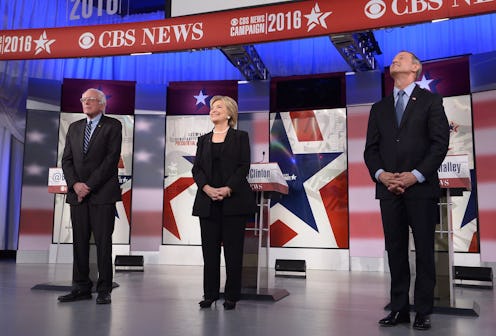News
Ranking The Democrats On ISIS From Good To Better
With ISIS continuing to grow, terrorist attacks in Western countries making headlines, and the Syrian refugee crisis only getting worse, it’s looking more and more like the 2016 election will focus heavily on foreign policy. Americans’ fear of terrorism is higher than at any point since the Sept. 11 attacks, according to a recent New York Times/CBS News poll. The presidential candidates’ ideas on how to maintain order in the world will be under a harsh spotlight for the next year. How do the Democratic candidates’ policies on ISIS differ? And which would be the most effective?
The biggest gap in anti-ISIS policies lie not between the individual candidates, but between the two parties themselves. Democrats and Republicans have wildly different solutions to dealing with terrorism, and the gap between, say, Hillary Clinton and Bernie Sanders' views is far smaller than the chasm between any Republican and any Democrat. But still, there are nuances even within the parties, and for some voters, the differences in the Democratic candidates’ positions on how to deal with ISIS could be the deciding factor in the voting booth. Here are exactly what those nuances are:
Where They Agree
When it comes to ISIS, the Democrats’ positions are far more similar than different. Clinton, Sanders, and Martin O'Malley all agree that an international coalition must be assembled to fight the group, and that the bulk of responsibility for dealing with ISIS lies with other countries. They believe that an American ground invasion of Iraq or Syria is a bad idea, and that other countries in the region — specifically, the Arab gulf states — should deploy ground troops to defeat the group. Clinton and Sanders both support the ongoing U.S. airstrikes against ISIS, while O’Malley hasn’t said where he stands on it.
The general view of all three candidates is that, while the U.S. must provide some form of leadership in the anti-ISIS fight, it can’t be America’s battle alone. All of them insist that when dealing with international crises like ISIS, diplomacy should be a first resort, and military action should be a last resort. However, none of them are willing to take the military option off the table entirely.
Where They Disagree
The only substantial policy difference between the Democratic candidates’ views on ISIS centers on the possibility a no-fly zone in Syria. This would involve the U.S. declaring part or all of Syrian skies off-limits to all air vehicles, except for those pre-approved by the United States. Any plane or air force that violated this ban would run the risk of being shot down by the U.S. military. Should a no-fly zone be imposed in Syria as a means of defeating ISIS?
Clinton believes that yes, it should. She says that a no-fly zone would both strengthen the fight against Syrian President Bashar al-Assad and offer safe refuge to Syrians fleeing ISIS. O’Malley and Sanders, on the other hand, oppose a no-fly zone. Sanders believes that it could result in “a never-ending U.S. entanglement in that region,” while O’Malley brings up the possibility that, with Russian planes already flying in the region, a U.S.-imposed no-fly zone could “lead to an escalation of Cold War proportions” if the U.S. accidentally shot down a Russian plane (or vice-versa).
There are some tonal differences between the candidates as well. Sanders, for example, emphasizes the role that the U.S. invasion of Iraq played in creating ISIS. Clinton doesn’t reject this proposition, but focuses more on the responsibility of local Iraqi forces in wiping out ISIS. O’Malley stresses the importance of intelligence sharing between countries more so than the other candidates. Both Sanders and O’Malley have said that climate change contributes to international terrorism, while Clinton has linked global warming to the Syrian refugee crisis, but not to terrorism in particular.
The Ranking
With regard to ISIS, the no-fly zone is the only discernible policy difference between the candidates’ positions. From this perspective, Sanders and O’Malley get the edge: The simple fact of the matter is that a no-fly zone wouldn’t be effective in fighting ISIS, because ISIS doesn’t have any planes. Add to that the possibility of a confrontation between U.S. and Russia, and the answer is clear: A U.S.-imposed no-fly zone in Syria is a bad idea, and a bad way to fight ISIS.
But Sanders and O’Malley’s positions on ISIS are almost completely identical, so it’s difficult to rank them. That said, I’m going to give Sanders the smallest possible edge over O’Malley, only because he is slightly more emphatic in stressing the role that the U.S. invasion of Iraq played in allowing ISIS to rise. This is a crucial fact to understand if ISIS is to be defeated. While O’Malley points out the role of the War in Iraq in creating ISIS, he also dilutes this point by emphasizing “the cascading effects that followed” the invasion.
That’s not exactly incorrect, but there’s a strong case to be made that once the United States decided to invade Iraq and remove Saddam Hussein from power, the rest of the story was 90 percent written, and that the rise of ISIS — or an ISIS-like group — was practically inevitable. Sanders grasps this more than O’Malley or Clinton, and this suggests a slightly more clear-headed understanding of Middle East politics.
This means that — despite the fact that he’s centered his campaign almost entirely on domestic issues — Bernie Sanders has the strongest anti-ISIS strategy, followed by O’Malley, and then Clinton. But this is largely an exercise in splitting hairs. At the end of the day, all three Democrats’ strategies are light years beyond the GOP’s proposals, which essentially amount to launching another ground war in the region. That would be catastrophic. All of the Democrats running for president understand this; they just differ slightly in their alternative proposals.
